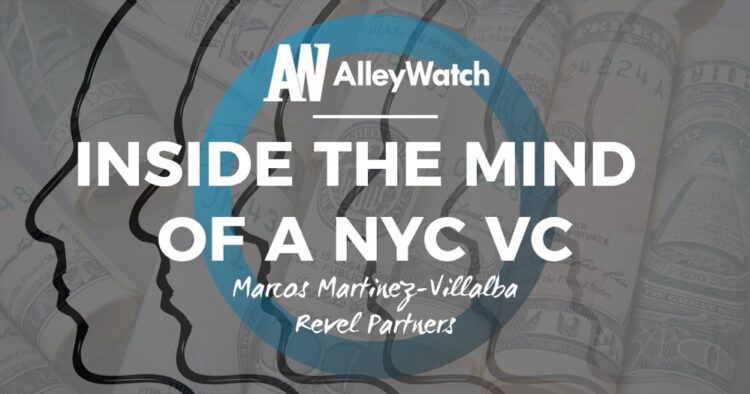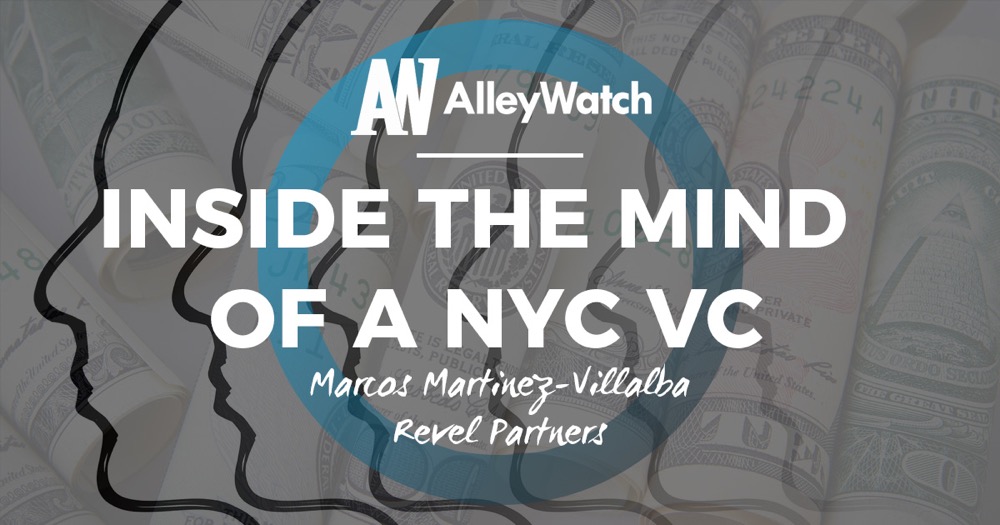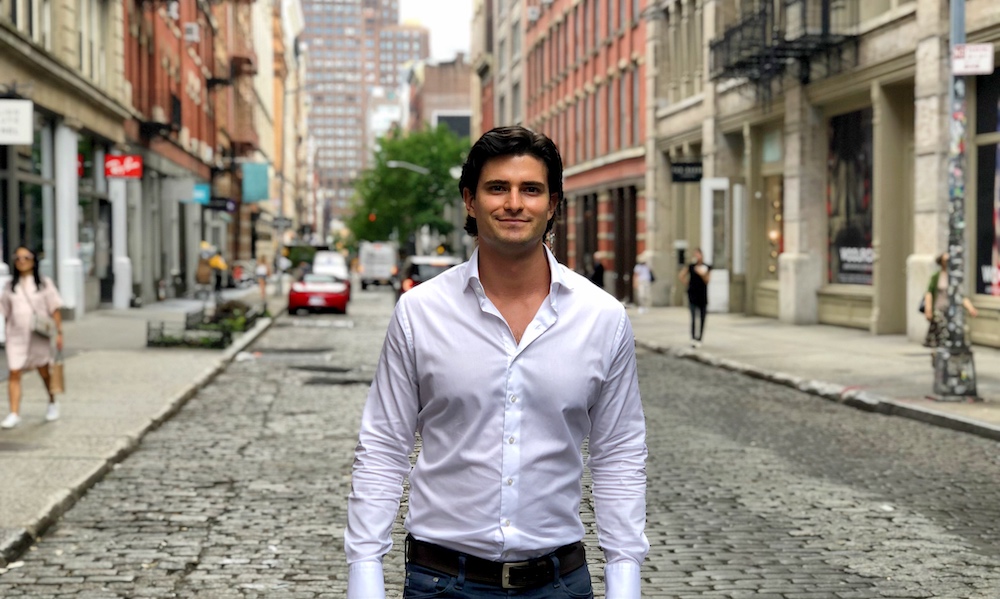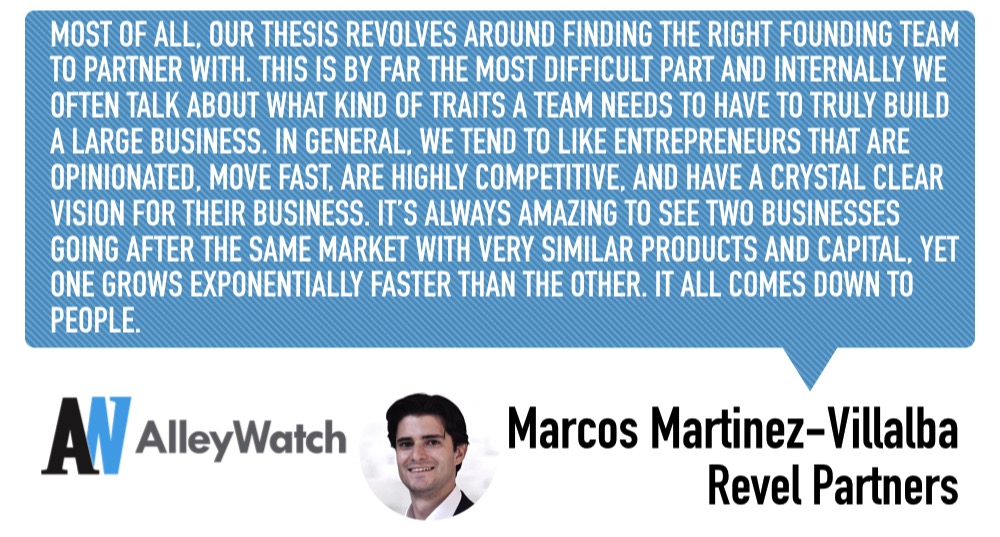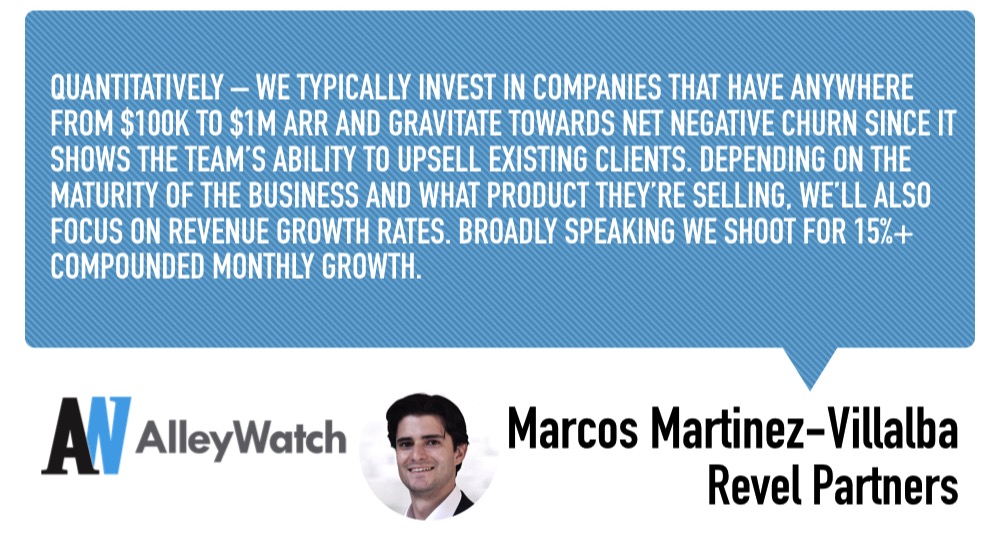Welcome back to Inside the Mind of an NYC VC, a highly acclaimed series at AlleyWatch in which we speak with New York City-based Venture Capitalists. In the hot seat today is Marcos Martinez-Villalba, a Venture Investor at Revel Partners, a founder-first B2B venture firm focused on investments in the US and Europe that was cofounded by four successful serial entrepreneurs in 2011. Currently investing out of its second fund (in Fund I, the GPs were the only LPs), Revel has made over 35 investments and its portfolio includes theTradeDesk (IPO), Receptive (Acquired by Verve), Vidible (Acquired by AOL), Beeswax, Fetcher, Curacity, and Narrative.
Marcos Martinez-Villalba joined Revel in the fall of 2016 after getting his start in venture in DC with Lavrock Ventures and Middleland Capital. We visited Marcos at the Revel offices, in Soho, for a candid and insightful conversation to learn more about Revel, his day-to-day responsibilities, how Revel’s founders’ experience as serial entrepreneurs serve as a value-add for founders, actionable and invaluable advice for entrepreneurs that are raising, and much more…
If you are a NYC-based VC interested in participating in this series, please send us an email. We’d love to chat. If you are interested in sponsoring this series that showcases the leading minds in venture in NYC, we’d also love to chat. Send us a note
Reza Chowdhury, AlleyWatch: Please tell us a little bit about your background and how you started in venture.
Marcos Martinez-Villalba, Revel Partners: I started out as an entrepreneur in the art world. I cofounded a company that was doing online auctions for emerging artists. That’s when I originally felt the rush of building something and the dedication that it takes. I also learned many valuable lessons that have shaped the way I think about business ever since. The most painful lesson I learned was to really understand the target customer before investing any time or money into the product.
I eventually ended up going back to business school at Georgetown where I met professor Jim Hunt who has an impressive track record as an angel investor. Jim was in the process of launching his own fund, now Lavrock Ventures, when he and his partner Stephen Smoot decided to take me on as a Venture Fellow. They were amazing early mentors and taught me many of the foundational basics of early-stage investing. That experience was really what got excited about pursuing a career in venture capital. I later went on to intern and work with several other firms throughout business school as I developed my network and broadened my investment skillset. Then, as I was about to graduate, one of my mentors introduced me to the Revel Partners team here in NYC where I have now been for the past three years.
Tell us more about Revel Partners.
Revel is an early stage VC fund focusing on Seed to Series A investments in B2B SaaS and marketplaces. Our HQ is in NYC, but we also have an office in Berlin so we look to opportunities anywhere in the US and Europe.
 The fund was started in 2011 by our four GPs Chris Young, Joe Apprendi, Thomas Falk, and John Vincent. All of them are former serial entrepreneurs, having collectively started and sold 11 companies over the past 25 years. They also have a long history of competing against one another as CEOs, cofounding companies together, and even becoming early investors in each other’s businesses. That’s what initially drew me to this team and why I still love being a part of it. Everyone at Revel is very close, experienced, and there is always an incredible dynamic of collaboration.
The fund was started in 2011 by our four GPs Chris Young, Joe Apprendi, Thomas Falk, and John Vincent. All of them are former serial entrepreneurs, having collectively started and sold 11 companies over the past 25 years. They also have a long history of competing against one another as CEOs, cofounding companies together, and even becoming early investors in each other’s businesses. That’s what initially drew me to this team and why I still love being a part of it. Everyone at Revel is very close, experienced, and there is always an incredible dynamic of collaboration.
Revel Fund I was the GP’s own capital and it turned out to be one of the top 10 best performing VC funds from the 2010-2014 vintages. That was an amazing portfolio because it had a great mix of experienced entrepreneurs that were able to drive good early exits as well as a $1B+ outcome.
We’re now actively deploying Revel Fund II where the GPs still contribute 50% of the capital. On a similar but slightly improved strategy to Fund I, we’re investing checks of $250k to $2M in about 10 companies per year as we continue adding to our family of entrepreneurs and helping them build world-class companies.
Is there a specific investment thesis that Revel deploys? Where is the firm’s sweet spot?
From a company lifecycle perspective, our sweet spot is somewhere in between a completed initial product with early revenue and up to about $1M ARR. This usually translates to Seed through early Series A, and it’s an especially good time for us to come in and add value since we have many years of experience in building out sales teams and setting up go-to-market strategies to prepare a company for hyper-growth.
Additionally, we look for very large markets where a recent change might have taken place that opens the door for technology to come in and have a big impact. Founders that can answer the ‘why now’ question with logic and have the data to back it up are often our favorites.
Most of all, our thesis revolves around finding the right founding team to partner with. This is by far the most difficult part and internally we often talk about what kind of traits a team needs to have to truly build a large business. In general, we tend to like entrepreneurs that are opinionated, move fast, are highly competitive, and have a crystal clear vision for their business. It’s always amazing to see two businesses going after the same market with very similar products and capital, yet one grows exponentially faster than the other. It all comes down to people.
Your official title at Revel is Venture Capital Investor. What does that role entail? Do you spend more of your time sourcing new deals, analyzing investment opportunities, or supporting portfolio companies?
I’m the most senior member of the investment team here at Revel. Most of my mornings are spent meeting with new companies and other investors. In the afternoons I’ll generally shift focus towards moving the ball forward on deeper funnel companies where we are in heavy due diligence and work closely with our partners throughout the negotiation and investment closing process. I personally try to catch up with my portfolio companies every month or so, and the level of support really depends on what they’re going through. It could be anything from helping them to think through a new product idea, fundraising, or advice on a potential M&A opportunity. Then in the evenings, I’ll usually attend industry events or the occasional panel to continue building my network.
Tell us about a deal that you sourced at Revel that the firm invested in? How did it come to fruition? What gave you the conviction that this was a compelling opportunity?
I have sourced several investments while at Revel and I’m very proud of all of them. My first one was a company called Fetcher that leverages AI to automate candidate recruiting. The company’s team is truly exceptional and when I first met Andres Blank, the Founder & CEO, I was instantly drawn to his vision of a world where enterprises no longer put out a job description and just wait for the best candidates to come to them. At a cost that is 10x cheaper and 20x faster than hiring an agency.
Andres is also a proven second-time entrepreneur that had also shown an incredible ability to surround himself with top executive talent while burning almost no cash and generating solid revenue growth. The company has continued to grow significantly since our initial investment and I’m very excited to be a part of it.
How do you approach deal sourcing?
Most of my deal flow comes inbound from other investors and entrepreneurs. I dedicate a lot of effort to building trust and great relationships with those around me. In venture capital the network is everything. Other than that, I’ll sometimes reach out directly to a company if I’ve read an interesting article about them or just want to learn more about what they’re doing. At times this leads to potential fundraise conversations, but it’s not always the intent.
Most of my deal flow comes inbound from other investors and entrepreneurs. I dedicate a lot of effort to building trust and great relationships with those around me. In venture capital the network is everything. Other than that, I’ll sometimes reach out directly to a company if I’ve read an interesting article about them or just want to learn more about what they’re doing. At times this leads into potential fundraise conversations, but it’s not always the intent.
What are you excited about right now, from an investment standpoint?
I’m super interested in the supply chain and logistics industry. It’s just an incredibly large sector with limited technology and tons of fragmentation. Interestingly, the rise of e-commerce and direct-to-consumer has pushed companies to start leveraging technology and data for automation on things like marketing, product development, and customer support. Yet they still call a freight forwarder on the phone to ask for a quote because half the time there is not even a website. Then, to top it off, the freight forwarder calls their partners and asks them for a quote as well. In general, we see a lot of opportunities here and are looking closely for potential investments.
Another industry I really like is PropTech. Real estate is by far the largest asset class in the world, yet software spend is still relatively insignificant. It’s a very dated industry with almost no clean and accessible data. Most large property owners don’t even know their own square feet under management. Therefore, in this industry, we’re mainly looking for platforms that aggregate and centralize proprietary property, lease, and market data. We believe this data is core for new software companies and marketplaces to emerge.
There’s a growing trend towards what I would call “the platformization of venture” where VC firms are deploying more resources to help portfolio companies. Any thoughts on this? Is it sustainable?
I like that VCs are looking for more ways to help their portfolio companies, but whether they realize it or not, VCs are just playing a game of shifting costs from the startup to the fund. Some might say that this is the result of more funds competing for the same number of companies. Other VCs argue that it allows them to add value for their portfolio companies as well as establish best practices for recruiting, sales, etc. and that this creates larger exits in the long term. It could be.
If you think about it, the cost of the VC’s platform team comes from their management fee, generally 2%, which in turn comes out of their investable capital. For example, if a $100M fund collected 2% for 10 years, they would only have $80M left to invest in their portfolio companies. More fees mean less capital left to invest in companies. Therefore, a VC could technically keep that money they would have paid the platform team, lower their management fees accordingly, and invest the extra capital directly into the business as a larger check. Both sides might be better off since the VC could own more of the business or at least get a better return profile since it now has a lower bar to return the fund, and the company can allocate that extra cash where they feel they need it the most. Potentially to hire a recruiter that is specialized in their sector versus a platform generalist. At the end of the day, every fund has its own strategy and they do what works best for them.
What do you need to see from teams, both qualitatively and quantitatively, in order to invest?
Qualitatively – we prefer to see teams that have known each other or worked together in the past. The founding CEO’s personality is particularly important to us. We really want CEOs that are very smart, confident, move faster than anyone else, and can explain what their business with ease and clarity. Additionally, we like to see evidence of the CEO’s ability to recruit top executive talent. This is especially important in the early stages when a company can’t afford to pay high salaries but still needs to build out a core executive team that will further help to build out the teams below them. An often-overlooked reality is that A players don’t like to work for B players, so if those early team members aren’t top performers, the future org is unlikely to get any better.
Quantitatively – we typically invest in companies that have anywhere from $100k to $1M ARR and gravitate towards net negative churn since it shows the team’s ability to upsell existing clients. Depending on the maturity of the business and what product they’re selling, we’ll also focus on revenue growth rates. Broadly speaking we shoot for 15%+ compounded monthly growth.
Lastly, we typically look for companies that have raised between $300k and $3M in the past.
What metrics do entrepreneurs overlook or not place enough emphasis that are important to consider when you are evaluating investment merit of a business especially in your sphere, where the company is post revenue?
Most entrepreneurs tend to underestimate how much VCs factor in revenue growth rate into their valuations. Once a business is generating real revenue, growth rate becomes the most significant contributing variable in valuation and some VCs will even use it as a proxy for product/market fit. All else equal, the difference in valuation for a business growing 10% per month vs 15% per month can be massive. Founders should be very aware of this when negotiating terms.
For first-time entrepreneurs who are seeing term sheets for the first time, what advice do you have in terms of deal terms to pay particular attention to? On what terms can entrepreneurs push back and when is it appropriate to do so?
For a first-time entrepreneur, I would definitely seek out an advisor that is in touch with current market terms. There are plenty of resources online and the NVCA also has model documents that are useful to start learning how these terms look on paper.
In the Seed and Series A stages, I would generally recommend staying away from overly aggressive terms such as participating preferences, cumulative dividends, option pools above 10%, or full-ratchet anti-dilution provisions. These kinds of terms are generally a sign of an inexperienced early stage investor and they may sometimes backfire in future financings.
In the Seed and Series A stages, I would generally recommend to stay away from overly aggressive terms such as participating preferences, cumulative dividends, option pools above 10%, or full-ratchet anti-dilution provisions. These kinds of terms are generally a sign of an inexperienced early stage investor and they may sometimes backfire in future financings.
However, I sometimes see first-time entrepreneurs pushing back on founders’ stock vesting more than they should. Those terms are there for the founding team’s own protection and are meant to prevent situations where one teammate quits, walks away with 20%+ of the business, and the rest of the founders have to work even harder for the same equity.
What can entrepreneurs do to ensure that the relationship between the firm and companies is fruitful post investment?
Maintain frequent communication. Investors love monthly or quarterly updates to see how things are going, and it gives the company an opportunity to put in writing what it is they need help with. The best relationships are built around transparency and honesty. We understand that things don’t always go as planned, and I would encourage founders to be more open with their investors about their problems so that the investors know where to offer help. Building a company is a team effort, no one does it alone.
What are some things that you repeatedly see early-stage companies and founders struggle with?
Not talking to enough customers before building the product and hiring the wrong Head of Sales. Both are very common mistakes that can set the company back a full year.
Quick Hits:
Who do you admire in the startup world and why?
Tony Hsieh – CEO of Zappos. His book Delivering Happiness is probably the best guide for creating an amazing company culture. Tony is also an incredible entrepreneur that truly wanted to build a business where people would look forward to work. It’s sad how few companies think about employee happiness even though that’s where people spend most of their lives. Tony made this his top priority from day one and it translated into a highly profitable company.
When you put on your headphones and need to get head down in something, what are you listening to?
Roberto Cacciapaglia.
What’s the last book you read?
Rubicon: The Last Years of the Roman Republic by Tom Holland.
What’s your favorite restaurant in the city?
Café China. They take no reservations and the food is amazing. Try the spicy cumin lamb. It will change your life.


